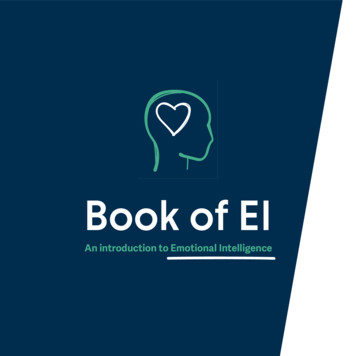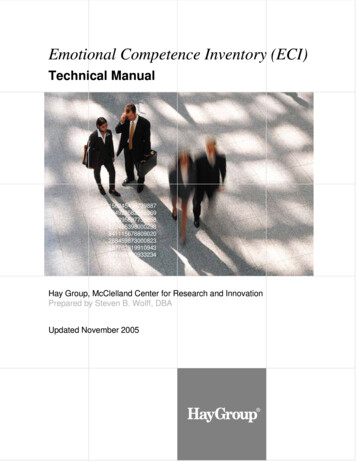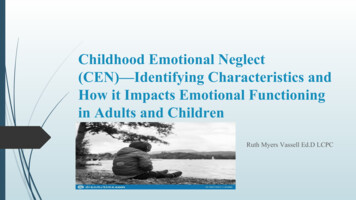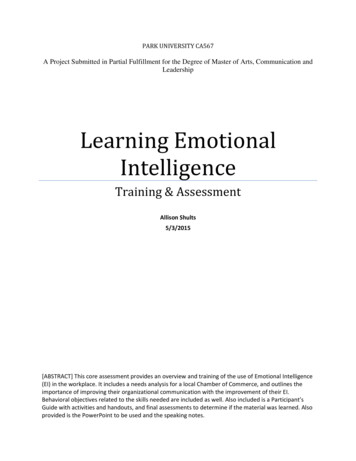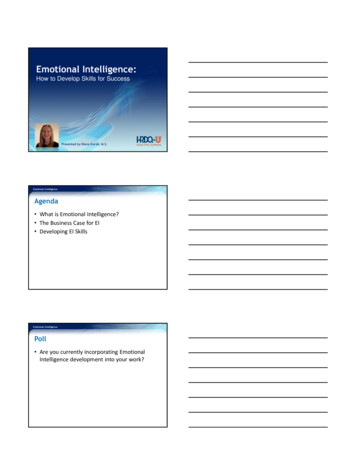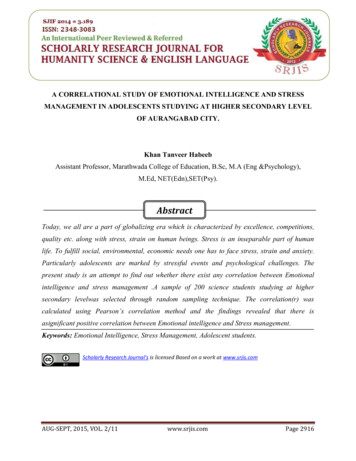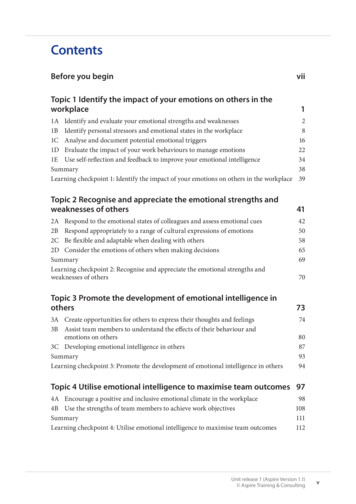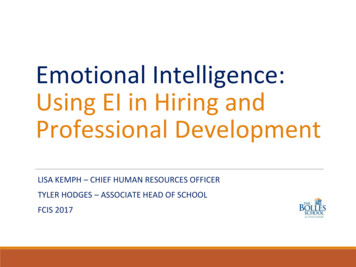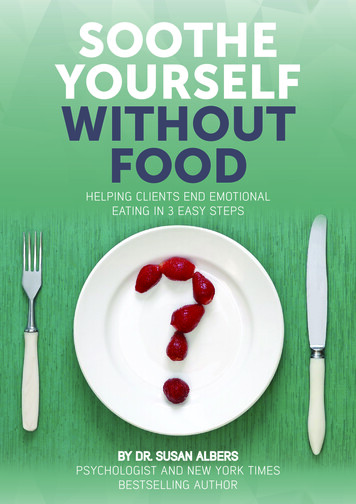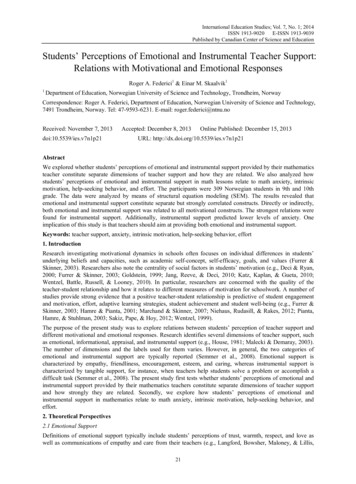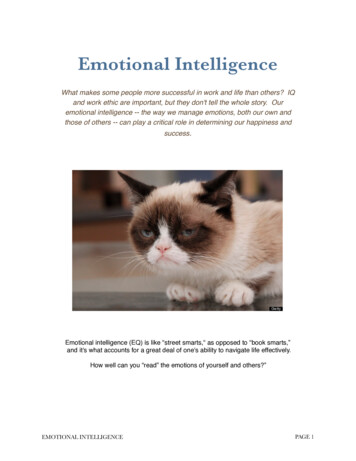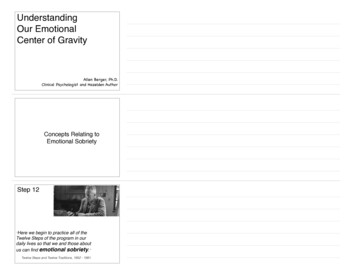
Transcription
UnderstandingOur EmotionalCenter of GravityAllen Berger, Ph.D.Clinical Psychologist and Hazelden AuthorConcepts Relating toEmotional SobrietyStep 12“Herewe begin to practice all of theTwelve Steps of the program in ourdaily lives so that we and those aboutus can find emotional sobriety.”Twelve Steps and Twelve Traditions, 1952 - 1981.
Bill Wilson’sConcepts Related to Emotional SobrietyReal Maturity and BalanceHumility in Relationship to Self and OthersEmotional Dependence - Created a Need for the Possessionand Control of People and Circumstances Surrounding UsCart Before the Horse Impossible Way of LifeExamine Our Emotional Disturbance to Identify OurExpectations and Our Unhealthy DependenceTranscending Our Faulty Emotional DependenciesDependencies Need to Be Broken at DepthEarnie Larsen“ Stage II Recovery gets at the underlyingpatterns and habits that caused us trouble inthe first place. And if nothing changes, thennothing changes the same results will pop upthrough our whole life (p. 83).”Step 4“ We learned that if we wereseriously disturbed our firstneed was to quiet thatdisturbance, regardless ofwho or what we thoughtcaused it.”Twelve Steps and Twelve Traditions,Alcoholics Anonymous, 1952
Step 4“ Where other peoplewere concerned, we hadto drop the word blamefrom our language. Thisrequired greatwillingness to begin.”Twelve Steps and Twelve Traditions,Alcoholics Anonymous, 1952Step 4“It never occurred to usthat we needed tochange ourselves tomeet conditions,whatever they were.”Twelve Steps and TwelveTraditions, AlcoholicsAnonymous, 1952“When something goes wrong I tryto make a picture in my mind of acircle with myself in the middleand then I ask myself what part inmy problem are my thoughtsplaying, my fears, .myexpectations, myinterpretations.and my lack offaith to be able to grow .”Virginia Satir, Ph.D.
Physical Center of GravityPhysical Center of GravityThe Shift in the Location of the Emotional Center of Gravityin Emotional SobrietyI’mI’m OKOK evenif ?if ?
“Our dependency makesslaves out of us, especially ifthis dependency is adependency of our selfesteem. If you needencouragement, praise, patson the back from everybody,then you make everybodyyour judge.”"We are always trying to getout of our emotional jail .Mostly we try by begging,threatening, or pleasing otherpeople, trying to get them todo it for us.”“In my emotionalimpoverishment, I tend to seeother people essentially assources of approval ordisapproval. I do not appreciatethem for who they are in theirown right. I see only what theycan or cannot do for me. ”Nathaniel Branden (1994) - The Six Pillars ofSelf-EsteemVirginia Satir, Ph.D.Dr. Nathaniel Branden
“At the core of this alienationfrom the actual-self is theloss of the feeling of being anactive determining force inour own lives.”Karen Horney, M.D.Neurosis and Human Growth: TheStruggle Toward Self-Realization“The integrity of a person isimpaired because of the alienationfrom the self, the unavoidableunconscious pretenses, the alsounavoidable unconsciouscompromises due to unsolvedconflicts, the self-contempt - allthese forces lead to adiminished capacity for beingsincere with oneself.”Karen Horney, M.D.Neurosis and Human Growth: The Struggle Toward Self-Realization“If I do not feellovable, then it isvery difficult tobelieve thatanyone else lovesDr. Nathaniel Branden
“If you are not eternallyshowing me that you livefor me, then I feel like I amnothing.”Virginia Satir, PeopleMaking“We use our beauty, our cleverness,our charm to capture someone for apartnership, as if he were an animal.And then when he wants to get out ofthe cage, we’re furious. That doesn’tsound very caring to me. It’s not selflove. I want my husband to wantwhat he wants. And I also notice thatI don’t have a choice. That’s selflove. He does what he does and Ilove that. That’s what I want becausewhen I’m at war with reality, it hurts(p.73).”Byron Katie (2005). I Need Your Love - Is That True. Three River Press: NY.Four Principles that Operate inOur RelationshipsJames Hollis (1998), The Eden Project: In Search of the Magical Other A Jungian Perspective on Relationships.
James Hollis, Ph.D.1)What we donot know aboutourselves and what we cannot dofor ourselves will be projected ontoour partner.James Hollis, Ph.D.2) We project our childhood wounds,our infantile longings, and ourindividuation imperative onto ourpartner.We project onto ourpartner the responsibilityto do for us what wearen’t able to do forourselves.
James Hollis, Ph.D.3) Since our partner cannot, nor should not,bear responsibility for our wounds, our narcissismor our individuation, our projections (demands)give way to resentment which results in theproblem of power (manipulation).James Hollis, Ph.D.4) The only way to heal a faltering relationshipis to take responsibility for ourindividuation (raise our level ofdifferentiation).“So if your partner is angry, good. Ifthere are thing about him that youconsider flaws, good, because theseflaws are your own, you’reprojecting them, and you can writethem down, inquire, and set yourselffree. People go to India to find aguru, but you don’t have to: You’reliving with one. Your parter will giveyou everything you need for yourown freedom. (p.90).”Byron Katie (2005). I Need Your Love - Is That True. Three River Press: NY.
The aim of therapy is “ to help a personabandon his drive toactualize the idealizedself and move towardsself-realization.”Karen Horney, M.D.The Therapeutic Process: Essays andLectures - 1999, p. 177.“It is not possible for me torelate to others intimatelyand allow (and enjoy) theirfull expression ofthemselves if I have notdiscovered how to do this formyself.”Dr. Jerry Greenwald (1975). Creative Intimacy:How to break the patterns that poison yourrelationships. Simon & Schuster: NY.“The essential goal oftherapy is to helppatient’s liberate andstrengthen theconstructive forces withinthem, while weakeningthe forces that areobstructive to growth.”The Therapeutic Process: Essays and Lectures - 1999, p. 248.Karen Horney, M.D.
“We must not allowother people’slimited perceptionsto define us.”“Remember, emotional sobrietyhelps you know yourself, Knowwhere your center is, and hold onto it. One of the things you need tolearn to do to hold on to yourcenter is to stop letting otherpeople edit your reality.”“Our emotional dependency pullsfor a certain kind of togethernessor connection. It demands that wefeel the same, and think the same,if we are to feel close to anotherperson.”Virginia Satir, Ph.D.
"Life is not what it'ssupposed to be. It is whatit is. The way you copewith it, is what makes thedifference.”“If you understandthe situation youare in, and let thesituation which youare in control youractions, then youlearn how to copewith life.”Virginia Satir, Ph.D.
Contact InformationAllen Berger, Ph.D.1635 Valecroft AvenueWestlake Village, CA 91361818-584-4795E-mail: abphd@msn.comWebsite: www.abphd.com
from our language. This required great willingness to begin." Twelve Steps and Twelve Traditions, Alcoholics Anonymous, 1952 Step 4 "It never occurred to us that we needed to change ourselves to meet conditions, whatever they were." Twelve Steps and Twelve Traditions, Alcoholics Anonymous, 1952 Step 4 "When something goes wrong I try
